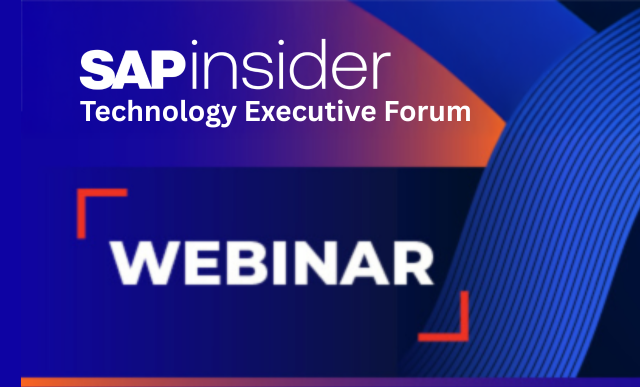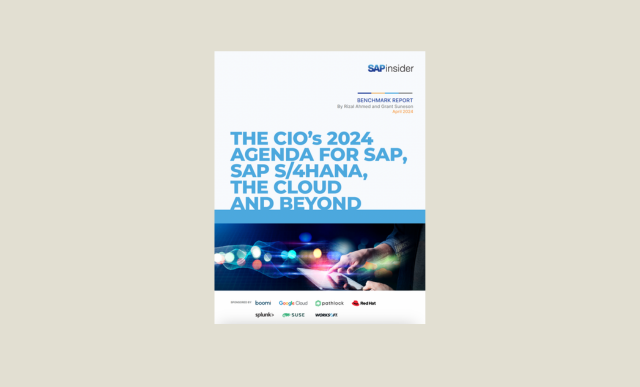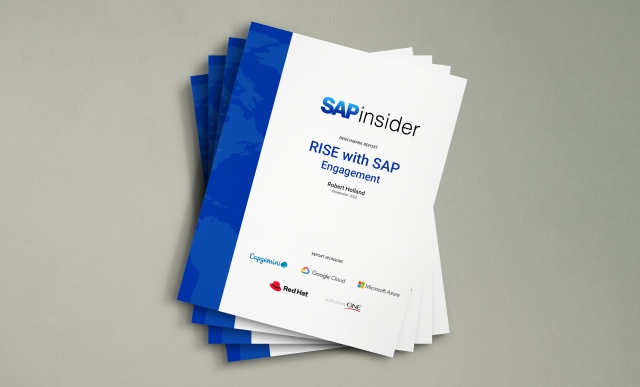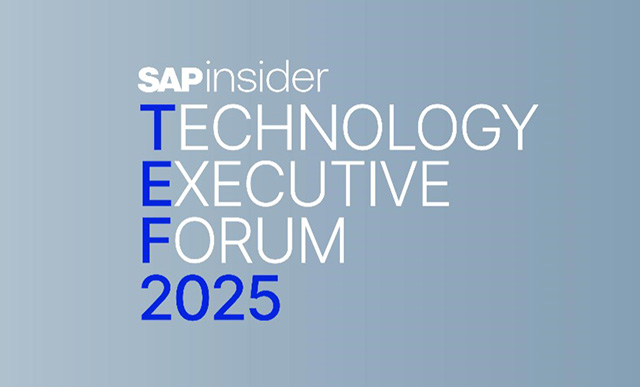In this episode of the SAPinsider Las Vegas 2025 podcast, host Robert Holland speaks with Larry Brownstein, a seasoned clinical trial expert with over 25 years of experience, about the intersection of SAP technology and the clinical research landscape. Brownstein explores the opportunities for pharmaceutical companies to better support clinical trial sites—especially smaller, independent ones—by leveraging SAP tools beyond logistics and supply chain management. He highlights patient recruitment and retention as key challenges that could benefit from SAP’s data-driven insights, particularly if clinical sites had greater access to actionable analytics. Brownstein underscores the disconnect between pharmaceutical sponsors using SAP and the trial sites conducting the research, emphasizing the need for improved collaboration, cost-effective solutions, and scalable, site-friendly platforms. He suggests that SAP and its partners could play a pivotal role in transforming the clinical trial experience for both practitioners and patients, helping bridge the gap between large-scale enterprise solutions and on-the-ground clinical operations.
LV Podcast_LarryBrownstein
0:00
Hello, I'm Robert Holland, and this is the SAP Insider Las Vegas 2025 podcast.
0:06
Thank you for listening as we speak with SAP insiders and industry experts about their experience in the SAP space.
0:13
In this episode, I'm speaking with Larry Brownstein.
0:16
Larry, why don't you tell us a little bit about yourself and what you do?
0:20
Sure.
0:21
Thanks for having me, Robert.
0:24
I have a long and deep experience in the clinical trial space, been in the business 25 plus years in at site level a trial work.
0:36
So our primary business over the last excuse me, over the last 2530 years has been running clinical trials for big pharmaceutical companies and frankly smaller as well.
0:49
What that means is when a a pharma company is looking to develop a new drug, they need to test it extensively.
0:59
And that's done throughout early stage phase 1234 research on human beings.
1:08
And those human beings come into a clinical site like ours and are invited to participate in that trial.
1:18
Without getting into all the gory details of the science of it, we need clinicians, we need patients and we need emerging drug technologies to run those trials.
1:32
And that, that experience for me has been very rewarding as we watch new drugs come to market that are life changing and we see patients responding very positively over the course of many, many years.
1:49
I don't know if that's too deep a dive or you want to hear more about the boring side of the, the trial work.
1:55
No, I, I think that's great because I mean, there's a lot of pharmaceutical companies that have big SAP implementations.
2:02
I mean, there's, I mean, one that springs immediately to mind is, is Pfizer, They're one of the biggest SA PS Rahana implementations that SAP has large, large single system.
2:11
But I think the difference here is that these organizations are using them on an operational level and you're coming at it more from the clinical perspective, right?
2:22
How can we utilize it in a trial, for example?
2:25
So where do you sort of see opportunities both for some of these pharmaceutical companies and for SAP in the space?
2:31
Yeah, I appreciate the question, Robert.
2:34
I think the distinction is how we define operational, right?
2:39
So when we talk about operationalizing the clinical trial that may be getting lab supplies to many, many clinical facilities throughout the world as a global clinical trial kicks off, some of that is supplied just in time.
2:54
And SAP is a huge backbone for delivering those clinical supplies globally as clinical sites need them.
3:03
And there are many, many other elements of SAP deployment in the clinical space.
3:11
But where there seems to be a lot of opportunity, especially with the advent and emerging value of artificial intelligence and and big data is patient recruitment.
3:23
That's a very fractured area.
3:25
It's a very frankly weak area across clinical trial work.
3:31
And I think that there's a great opportunity for big companies that have sort of travelled the path of SAP and partnered deeply with SAP and, and use the platform across their company to make that learning and that investment available to the smaller clinical sites out there.
3:55
Dermatologist that may just have 3 or 4 employees, but is running a pivotal clinical trial for any, any pharmaceutical company that's already using SAP, right.
4:10
So I, I think that you know, look there's some barriers to entry for the smaller sites specifically the cost, the time, the learning.
4:19
We don't have generally big IT support folks in a clinical site.
4:26
But as those sites get larger, they're generally part of roll ups, maybe private equity backed roll ups, as I've been a part of a number of times in my career.
4:37
But it's very hard for even a roll up to press that software platform into the new clinics as they acquire them.
4:48
If it were coming from the pharma sponsor who's already using it, who has great penetration into the SAP knowledge base, there could be a real opportunity to help the sites recruit patients more thoroughly.
5:06
Yeah, I think that makes a lot of sense because, I mean, obviously solutions like SAP transportation management, this helps them get the supplies, get the, you know, everything they need to the site of the trial at the time.
5:19
But whoever's conducting the trial isn't necessarily using those solutions.
5:23
They're simply leveraging what's coming from the the, you know, the big pharmaceutical company.
5:29
So it really sort of seems like there's a a significant opportunity for some of these pharmacal, some of these pharmaceutical companies to to leverage SAP solutions in ways that they're perhaps not now and to help the smaller groups that help them conduct the trials, you know, conduct these clinical clinical trials with that process particularly.
5:54
And I think, you know, you sort of hinted a little bit at things like patient recruitment, which can be quite difficult.
5:59
Yeah.
6:00
You know, I don't want to overplay or overemphasize the clinical the, the recruitment piece of the puzzle.
6:07
But I will say that it it's seemingly a big gap, an opportunity at the clinical site level.
6:13
We're under tremendous pressure to recruit more patients more quickly, retain patients more effectively.
6:19
They're very expensive to find.
6:21
The cost of acquisition is very high in some cases and the learnings are not generally shared among and between clinical sites.
6:32
Yet a place a place, a company that is sponsoring the trial, Pfizer, Janssen, J&J, any of anybody that is already paying the clinical site should have access to deep dive data around the techniques that are used, the messaging, the net cost per patient, whether these patients are easily retained and frankly if they give good clinical signal, right.
7:04
We know about placebo response and we know about early dropouts from clinical trials And all of that data is synthesized very deeply by the pharma sponsor and SAP is a big driver of that.
7:21
But never does it really come back to the site and, and the learnings passed along and shared, right.
7:30
So, so we're users of the SAP technology, but we're not beneficiaries, if you will.
7:36
Yeah, they're, you're, they're absorbing the data.
7:38
They're bringing in all the, all the data that's coming from the trial.
7:42
They're analyzing it, you know, breaking it down by who had the real drug, who had, you know, whatever version of it, who had a placebo drug response, drug response demographic, all that sort of information and they're processing it.
7:57
But if the the centres that are helping them conduct some of those trials don't get access to that information, that's got to be a a major challenge for them for future recruitment.
8:09
Yeah.
8:09
Important distinction here that we have to make is these trials at least in Myspace are 99% double-blind, right.
8:18
So at the site level we're blinded to as to who is taking live medication, who is taking dummy placebo medication.
8:25
And so we don't want to blur that line ever.
8:28
But what I would say is that the the learnings of business techniques, how did you recruit the patient?
8:36
Where did they come from?
8:38
Not necessarily did they have a drug response?
8:40
We can find that out after the trial is complete and reverse engineer our recruitment techniques, our retention techniques and, and take those learnings into the clinic and then they become business operations, right.
8:56
It says, hey, we have a sizable budget for recruiting patients here.
9:01
What worked last time, what didn't work last time and how can we again leverage those same learnings?
9:07
Yeah.
9:07
And I think that's an important differentiation that they're not necessarily getting any insight into the the efficacy of the trial itself or the drug itself on any of the patients they've recruited.
9:18
They're getting insight into the process, how it worked, how they can do it better, how they can make it more effective in the future.
9:27
Yeah.
9:27
How how about paying patients, right.
9:30
These patients are generally compensated, some quite substantially, right?
9:36
Who responds positively to the money?
9:38
Who responds negatively?
9:40
And what is the net impact on the clinical trial?
9:44
These are all big pieces of data many times over, every single visit.
9:49
You could have maybe as many as 50 or 100 patient visits in a course of two or three years, right?
9:58
A lot of data is collected and a lot of it and of course all of it is the property of the sponsoring pharma company.
10:08
So in order for us to study it, we're using quite frankly Excel spreadsheets and anecdotal reporting from a call center hold times and incoming calls and patient attribution and things like that, that while it may be quite advanced in relative to my competitors, it quite frankly it's it's very rudimentary.
10:36
Yeah.
10:37
So we've talked a little bit about what the opportunity is for pharma companies when it comes to doing more, you know, moving beyond simply the processing of data that's currently in your systems today.
10:53
What what is it that you think that SAP needs to do to make this sort of technology more available?
11:02
Yeah, it's a it's a terrific question.
11:04
I mean, I almost have to chuckle and say, gosh, if I knew that I'd walk right across the hall here and and tell them, you know, I think we have to understand the challenges of clinical site management to properly answer that, right.
11:25
As I mentioned earlier, many of the sites are quite small.
11:28
And when I say small, I mean again, could be a few employees dedicated to clinical research.
11:36
And then there are larger sites still.
11:39
It's a physician generally a physician owned business, right where they're perhaps dabbling in research or perhaps they've given up their private practice and gone 100% into clinical research, which is really our business model.
11:55
But there's still a gigantic, I don't want to say fear, but you know, it's, it's a big bad term that we're going to put technology on you, we're going to put a new software platform.
12:08
And when we look at the roll ups, you know, you have $100 million coming in from private equity to roll up 6 or 8 or 10 clinical research sites.
12:17
Well, then that is an opportunity, right?
12:21
And, and you know, I would say cost training, awareness, these are all things that we could do to break down some of those barriers.
12:29
But when you take, at the very core of it, when you take a clinical site that at one point or another was relatively small homegrown de Novo growth, they started by doing a couple of trials and they were doing more than they were doing more.
12:45
There is not a sense there.
12:49
Well, sensitivity probably isn't the right word, but there's a great sensitivity to cost of, of implementation, training, timing, migration from finance platforms.
13:02
Are we using Quicken, Are we using QuickBooks?
13:05
Are we using Peachtree?
13:06
Does it integrate with the pharma patient visit platform?
13:13
Right.
13:13
And there are a bunch of different out-of-the-box softwares that are dedicated to running the clinical trial site, but they're not integrating nicely with the pharma platform that has just in time delivery of clinical trial the drug material, right?
13:33
So I think it it's it's kind of a combination of better, better understanding of the site needs, right, and deeper training, deeper branding, deeper awareness and and probably some price matters.
13:54
You know, scaling down is very, very hard.
13:57
Scaling up is is a lot easier.
14:00
So I think there's got to be ASAP light understanding for the smaller sites that are really the drivers of these very important trials.
14:12
Yeah.
14:13
So it really seems like there's a lot of opportunity not just for pharmaceutical companies to work more closely with the sites that are conducting a clinical trials and doing more in that space, but also for SAP to provide the tools to help those pharma companies do that work.
14:30
Yeah, I mean, you've said it really the, the, the way that I view the market is you've got these big pharmaceutical companies and again, as I mentioned earlier, there's there's small ones too that are trying to develop biotech formulations and other such things.
14:46
But they're, and so you have SAP who is a monster in the industry and, and very well regarded in that space.
14:53
And they're partnered with the biggest of the big and, and some of the smallest of the small as they look to develop a global trial.
15:01
But the, the sort of the little stepchild vendor in that is the clinical site.
15:07
And as I think I mentioned earlier, but finer point is that some of these sites can be very large.
15:13
It could be running thousands of patients in a year, but there's not an empathy and understanding.
15:21
There's there's got to be some sort of a coming together, a summit, if you will, a collaboration that says if we put it on you at the site level, what does that do to your clinical operation?
15:36
And that's a learning that, you know, we've done many times over when we talk about cognitive testing, when we talk about what's it called the electronic voice response and, and, and things like that, where we're dialing in and having to answer many questions we have.
15:59
We've, we've got multiple different technologies.
16:02
For many years, we were, we were required to use a certain laptop for each and every patient, different laptop, right?
16:09
Secure T1 lines.
16:11
Those are all technologies put on us.
16:13
But when they put the 1st T1 line in my clinic 15 years ago, they came out and did it for us.
16:19
They didn't just say, Hey, figure it out and get AT1 line in here, right?
16:23
That's the kind of thing and they absorbed all the costs and all we had to do was at the end of the day plug in the computer to the line that they wanted us to use.
16:32
And I think that that kind of a collaboration where you leverage all of the power of a big company or two, right, that are already partnered for the greater good of speed to market, better conduct and business operational advantage, then you've got something really to talk about.
16:53
Well, that's been super interesting.
16:55
Thank you so much, Larry.
16:56
This is it.
16:57
There's a lot here that I think people can do in the future.
17:02
And there's a big opportunity for SAP if they want to do this sort of thing or for an SAP partner if they want to work with SAP to help these these pharmaceutical companies, small and large.
17:12
I think you'd make again, I hadn't thought of the SAP partner as much as, you know, I look at a Pfizer as an SAP partner, right?
17:18
But they're a business operating, they've got their own challenges.
17:22
As we know they're quite successful and I'm happy to to shine on them for a moment.
17:29
But the the point being is that there are many SAP insiders partners that could tackle that vertical and bring a lot of good to both the clinical site, not just both the, the, the sponsor, the site, the patient.
17:46
You know, we talked earlier this morning about customer experience, right?
17:50
The customer is the patient really he or she is volunteering to go into this clinical trial for sure.
17:57
Can we make it better for them, right?
18:00
Do we have to give them a Android piece of equipment that need be booted up and programmed or can we leverage SAP to help them do that?
18:11
If they're giving us a self reported outcomes at home, how's their sleep diary?
18:18
Right.
18:18
These are all elements of a clinical trial that that an SAP partner could absolutely tackle.
18:26
And, and I'm certain that there are some doing it, but it's not in a branded leveraged way where the net impact is obvious to the site.
18:37
Yeah, no, absolutely.
18:40
Well, it's been great talking, Larry.
18:41
Thank you so much, very much, Robert.
18:42
Appreciate the time.
18:43
Yeah, good.
18:44
Have a good day.
18:45
Likewise.









